Related Research Articles
Cadbury is a British-based confectionery manufacturer.

John Cadbury was an English Quaker and proprietor, tea and coffee trader and founder of Cadbury, the chocolate business based in Birmingham, England.
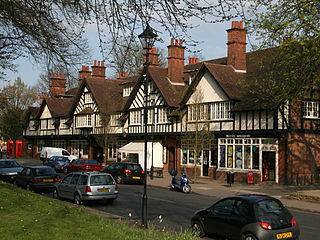
Bournville is a model village on the southwest side of Birmingham, England, founded by the Quaker Cadbury family for employees at its Cadbury's factory, and designed to be a "garden" village where the sale of alcohol was forbidden. Cadbury's is well known for chocolate products – including a dark chocolate bar branded Bournville. Historically in northern Worcestershire, it is also a ward within the council constituency of Selly Oak and home to the Bournville Centre for Visual Arts and the Cadbury's chocolate factory. Bournville is known as one of the most desirable areas to live in the UK; research by the Joseph Rowntree Foundation in 2003 found that it was "one of the nicest places to live in Britain".

George Cadbury was an English Quaker businessman and social reformer who expanded his father's Cadbury's cocoa and chocolate company in Britain.

Richard Barrow Cadbury was an English entrepreneur, chocolate-maker and philanthropist. He was the second son of the Quaker John Cadbury, founder of Cadbury's cocoa and chocolate company.
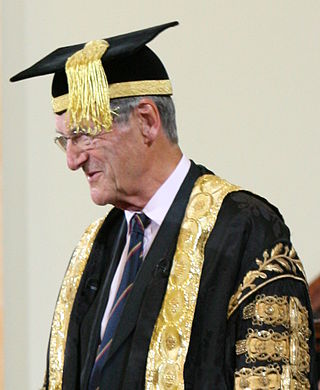
Sir Nicholas Dominic Cadbury is a British businessman and member of the Cadbury chocolate manufacturing dynasty. He was the sixth chancellor of University of Birmingham, stepping down in 2014.
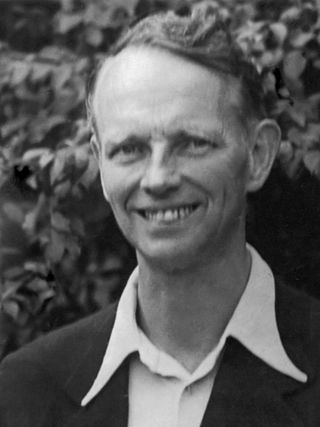
Cornelis "Kees" Boeke was a Dutch reformist educator, Quaker missionary and pacifist. He is best known for his popular essay/book Cosmic View (1957) which presents a seminal view of the universe, from the galactic to the microscopic scale, and which inspired several films.
Sir George Adrian Hayhurst Cadbury, was an English businessman who served as the chairman of Cadbury and Cadbury Schweppes for 24 years. He was also a British Olympic rower. Cadbury was a pioneer in raising the awareness and stimulating the debate on corporate governance and, via the Cadbury committee set up by the London Stock Exchange, produced the Cadbury Report, a code of best practice which served as a basis for reform of corporate governance around the world.

Bournville Village Trust is an organisation that was created to maintain and improve the suburb of Bournville, located in Birmingham. However, during the 20th century it expanded its geographical coverage to include developments in Shenley Green, Lightmoor in Telford, Bloomsbury in Nechells and Rowheath.
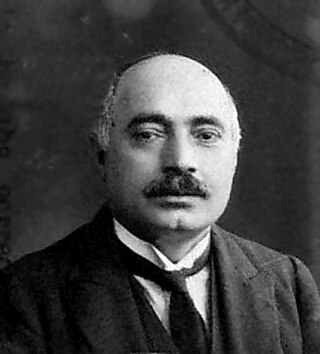
Alphonse Mingana was an Assyrian theologian, historian, Syriacist, orientalist and a former priest who is best known for collecting and preserving the Mingana Collection of ancient Middle Eastern manuscripts at Birmingham. Like the majority of Assyrians in the Zakho region, his family belonged to the Chaldean Catholic Church. Alphonse was born to Paolus and Maryam Nano, and had seven siblings.
Peter Egbert Cadbury was a British entrepreneur.
Major Sir Egbert "Bertie" Cadbury was a British businessman, a member of the Cadbury family, who as a First World War pilot shot down two Zeppelins over the North Sea: L.21 on 28 November 1916, and L.70 on 6 August 1918: the latter while flying a De Havilland DH.4 with Robert Leckie as observer/gunner.

Dame Elizabeth Mary Cadbury was a British activist and philanthropist. Her husband was George Cadbury, the chocolate manufacturer.

Richard Tapper Cadbury was an English draper, abolitionist and philanthropist. He came to Birmingham in 1794 and started a linen draper's business in partnership with a fellow Quaker. His children included John Cadbury, who was given help to start a tea and coffee business that would develop into Cadbury's. Successive later members of the family became important in the manufacturing and charity sectors, chiefly from their wealth and innovations in chocolate.
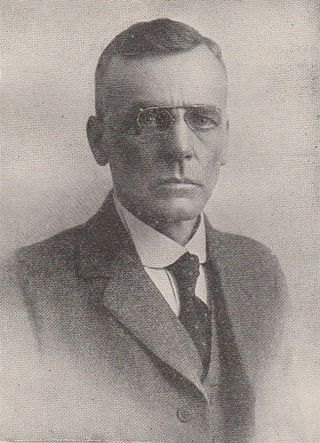
John Henry Barlow, widely called "the outstanding Quaker statesman of his generation", was an ambassador for peace in the war years and clerk of London Yearly Meeting for seven years. He was the person who most held the Society together at a taxing moment in its history. He was one of the first members of the Friends' Ambulance Unit. Later he served 23 years as the first secretary and general manager of the Bournville Village Trust. In 1920 he led a delegation to Ireland to look into the Black and Tans atrocities.

Dame Geraldine Cadbury, DBE was a British Quaker, author, social and penal reformer. Geraldine was one of the first women in Birmingham to become a magistrate. From 1923, she chaired the justices’ panel in the Children's Court of Birmingham. In the 1930s she assumed prominent positions on several Home Office Committees and International Associations.

William Adlington Cadbury, was an English businessman affiliated with his family company, Cadbury, which his grandfather, John Cadbury had founded. He was Lord Mayor of Birmingham in 1919-1921.

Dolobran, in the county of Montgomeryshire in Wales, is a historic estate which was the earliest known seat of the expansive Lloyd family, prominent Quakers, of which in the 18th century a junior branch, the Lloyd family of Birmingham, seated at Farm, Bordesley, became prominent in and around Birmingham as iron-founders and founded Lloyds Bank, today one of the largest banks in the United Kingdom. The grade II* listed manor house known as Dolobran Hall about 8 miles north-west of the town of Welshpool, is situated in the parish of Meifod to the west of the village of Meifod and to the east of the village of Pontrobert. One of the family historians, Humphrey Lloyd (1975), estimated the historic estate of Dolobran to have comprised about 1,000 acres. In 2015 Dolobran Hall and its 70-acre estate are used for farming and industrial training by the J.M. Evans Partnership. John Meirion Evans (1926–2015) of Dolobran Hall by his wife Edith was father to Maurice, Keith and Robert. In 2008 former farmer Rob Evans founded a company to train construction workers in the use of plant and machinery called "Training For The Future", based at "The Brick Barn Dolobran Hall".

Beatrice Boeke-Cadbury was an English-Dutch social activist, educator, and Quaker missionary. For her work educating and hiding Jewish children during the Holocaust, she was posthumously recognized as one of the Righteous Among the Nations.
References
- ↑ "Descendants of James Cadbury" (PDF). Retrieved 29 September 2020.
- ↑ "History of the Trust".
- ↑ "The lost chocolates from Quality Street, Roses, Celebrations and Heroes". Nottingham Post. Retrieved 1 November 2022.
- ↑ "Records of the Cadbury Trusts" . Retrieved 25 July 2018.
- ↑ "Mr Charles Lloyd Cadbury's director profile" . Retrieved 29 September 2020.
- ↑ "Aldermen hand in over £150 — in good cause". Birmingham Evening Mail and Despatch . 2 May 1996. p. 14. Retrieved 1 November 2022.
- ↑ "Edward Cadbury Charitable Trust".
- ↑ Hunter, Paul (2016). The Seven Inconvenient Truths of Business Strategy. Taylor & Francis. p. 102.
- ↑ "Sir Adrian Cadbury, corporate governance pioneer, 1929–2015". Financial Times.
- ↑ "Blue plaque unveiled in honour of Egbert Cadbury". Eastern Daily Press. 17 October 2013.